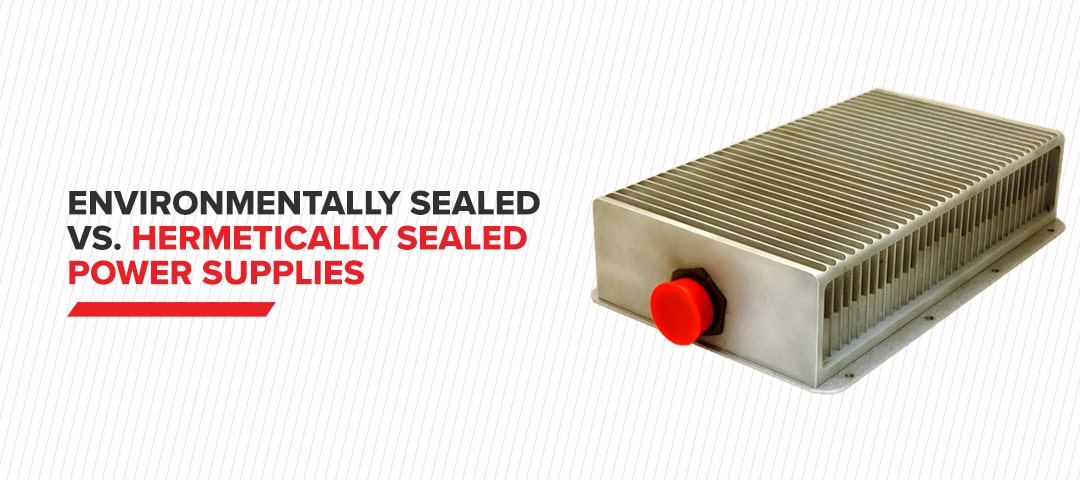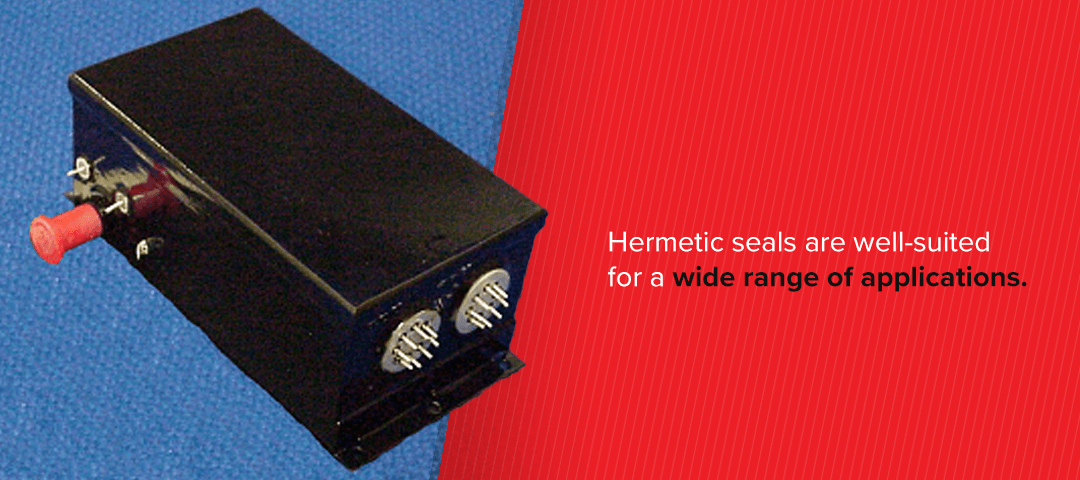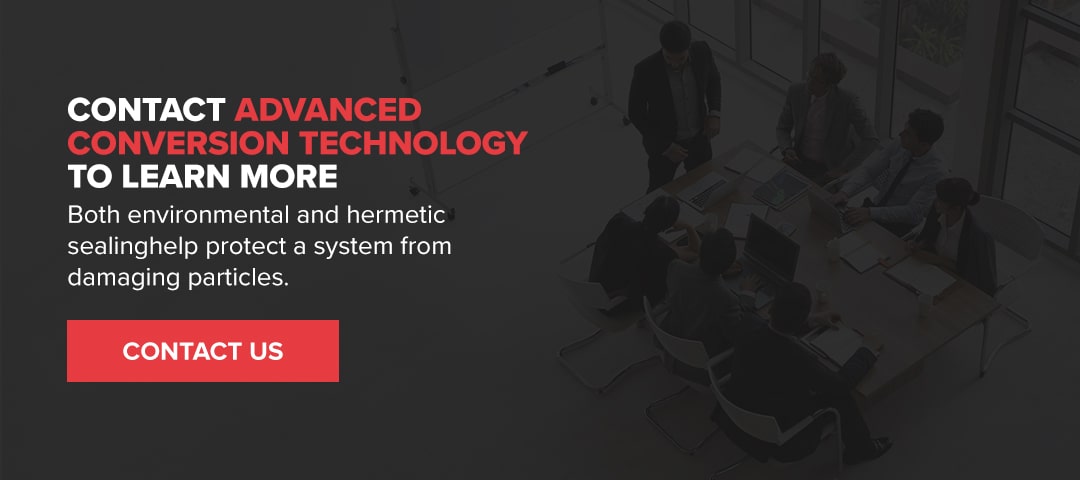
If a power supply needs protection from its environment, it’s important to use either environmental or hermetic sealing. In applications in which protection from dust or water particles is necessary, environmental sealing is sufficient. However, in applications in which air or gas-tightness is required, hermetic sealing is the stronger option. It’s essential to understand the difference between environmental and hermetic sealing, as well as the applications and benefits of each, to make the right selection for your purposes.
Quick Navigation:
- What Does Environmentally Sealed Mean?
- Environmentally Sealed Applications
- Benefits of Environmentally Sealing
- What Does Hermetically Sealed Mean?
- Hermetically Sealed Compressor Applications
- Benefits of Hermetically Sealing
- Contact Advanced Conversion Technology to Learn More
What Does Environmentally Sealed Mean?
An environmental seal, usually composed of rubber, acts as a barrier between the power supply and its environment. Environmental sealing helps prevent contaminants from breaching the power supply. This seal maintains the equipment’s electrical performance and is necessary for effective, safe equipment operation in many settings. An environmental seal is adequate when dust or water particles are a concern.
Environmentally Sealed Applications
Environmental seals are appropriate for applications involving mobile machinery, marine, aircraft, electronic warfare equipment, and on-highway vehicles. For such machinery to operate in an effective, safe manner, you must prevent infiltration of contaminants within electrical components. Dust, dirt, water, and other similar particles could damage the internal system, causing malfunction. Such malfunction could render the equipment unusable and present a safety hazard or require maintenance and repairs. Environmental seals keep this from happening.
Benefits of Environmentally Sealing
Environmental sealing has critical benefits for the above applications. An environmental seal:
- Protects against water damage: The infiltration of water can damage or even destroy an electrical system, immediately or over time. Water can lead to microbial growth, which can render equipment useless or present a safety hazard for those nearby. That’s why environmental sealing is essential when water damage is possible.
- Is dust- and dirt-proof: Dust and dirt infiltration can have similar effects, destroying an electrical system and related equipment. In applications where dust and dirt are prevalent concerns, such as with vehicles and electronic warfare equipment, environmental sealing is necessary.
- Can withstand high pressures: High-pressure environments can also damage a system if adequate precautions are not present. An environmental seal can withstand such high-pressure environments, reducing the risk of damage.
What Does Hermetically Sealed Mean?
The term “hermeticity” refers to the state of being airtight or gastight, meaning air and gas cannot escape the system. Hermetically sealed products, usually composed of glass, ceramic, epoxy or fluoropolymers, can withstand the highest pressures. Based on the definition of hermetically sealed, a system is hermetically sealed if contents cannot leak in or out over an extended period of time.
Hermetic sealing is important for vacuum processing, pressure vessels, and underwater-immersed devices. The most appropriate material depends on the application. For example, some applications require the least possible added weight, which would make an epoxy seal more appropriate than a heavier glass seal.
It’s possible to calculate a hermetic seal’s effectiveness as a leakage rate value, which refers to the amount of gas flowing through the seal per second. The more contents can leak through the barrier, the less effective it is. You can quantify leak ratings with the unit mbar L/s (millibar liters per second) for liquids or atm cc/s (atmosphere cubic centimeters per second) for gases.

Hermetically Sealed Compressor Applications
Because they can withstand such high pressure, hermetic seals are well-suited for a wide range of applications. Any application requiring air- and gas-tightness benefits from hermetic sealing. It can help protect equipment in the toughest settings or preserve goods, extending a good’s life span in storage.
Examples include aerospace applications, as well as military and deep offshore applications. Hermetic seals are also necessary for some types of packaging, such as pharmaceutical and food preservation packaging, using vacuum compression or canning. In addition, passive houses and zero-energy building techniques often incorporate hermetic seals to create more energy-efficient structures. Hermetic sealing is also used to preserve artifacts, such as the United States Constitution in Washington, D.C.
Benefits of Hermetically Sealing
A hermetic seal has many benefits for its relevant applications thanks to its airtight and gastight quality as well as its durability. Here are some of the reasons an application might require a hermetic seal.
Minimizes Diffusion and Off-Gassing Effects
The two ways gas can permeate a barrier are through leakage or diffusion. Leaks require material defects, such as a crack in the barrier. Such imperfections can cause the device’s failure. Diffusion is a natural process resulting from pressure difference. Gas can migrate through solids, regardless of existing defects. Off-gassing, or desorption, is the release of gas from a solid material. You may have heard of off-gassing in reference to volatile organic compounds (VOCs) escaping from household furniture.
The rate of leaking, diffusion and off-gassing depend on the size of the gas molecules in question. Smaller gas molecules are likelier to penetrate a surface. For instance, rates of penetration are higher for tiny helium molecules than larger nitrogen molecules. A hermetic seal can help reduce rates of both diffusion and off-gassing. The seal’s material is the main influencing factor — while rubber and plastic often allow for high levels of diffusion, stronger materials are more limiting. In many cases, a fluoropolymer, glass or epoxy hermetic seal is appropriate.
Minimizes and Prevents Virtual Leaks
A virtual leak occurs when a gas becomes trapped between the assembled components of a system. The gas could get caught between bores, screws or other working parts, posing a risk of system deterioration or other harm. Hermetic seals minimize the risk of virtual leaks in addition to other types of leaks.
Withstands Low to High Pressures and Altitudes
Many of the applications in which hermetic sealing is necessary involve extremes in pressure and altitude. For instance, avionic and related equipment require operation in high altitudes and high pressure. Similarly, deep offshore equipment must withstand some of the most extreme high-pressure environments on Earth. Hermetic seals are designed for such applications. They can withstand the lowest and highest pressures and altitudes. Stabilizing pressure on both sides of the system helps to minimize diffusion.
Withstands Extreme Temperatures
Such relevant environments are often home to extreme temperatures. Both deep-sea and atmospheric conditions involve extremely low temperatures. Meanwhile, rapid-moving and aerospace equipment must withstand extremely high temperatures.
Operates Effectively in Harsh Environments
While environmental seals are appropriate for everyday applications, hermetic seals can protect equipment in Earth’s harshest environments. Whether related to extreme temperature, extreme pressure or extreme altitude, a harsh environment necessitates a hermetic seal.
Contact Advanced Conversion Technology to Learn More
Both environmental and hermetic sealing help protect a system from damaging particles. Advanced Conversion Technology (ACT) frequently uses environmental sealing to achieve IP67 ingress protection rating on its products. Power supplies of any application may require one of these sealing technologies.
While environmental seals are sufficient for many applications, hermetic seals provide necessary protection in the most extreme, harsh environments. A hermetic seal is also used for high voltage power supplies (voltages typically greater than 10 kilovolts (kV) and currents in the microamp range) to limit arcing as well as environmental impacts.
If you’d like to learn more about environmental and hermetic sealing for your power supply, contact us at Advanced Conversion Technology. At ACT, we offer military-grade, flexible and customizable power supply solutions, and we’ll help determine what would suit your needs.
